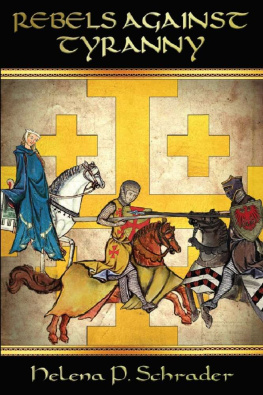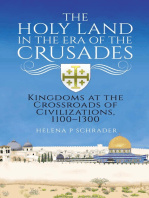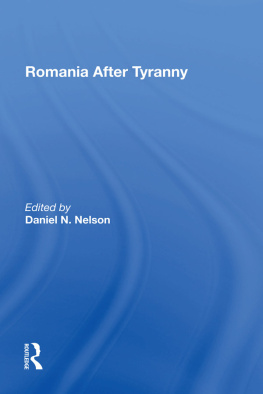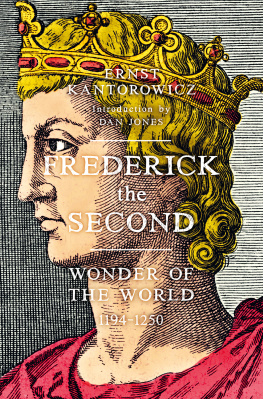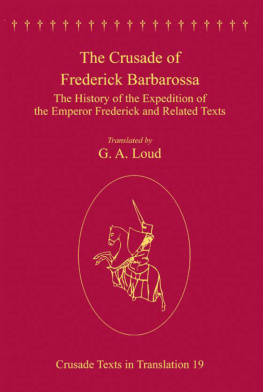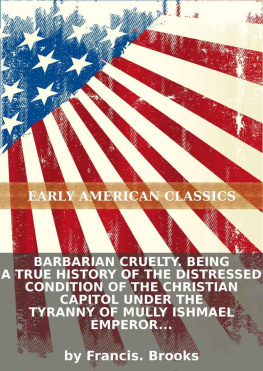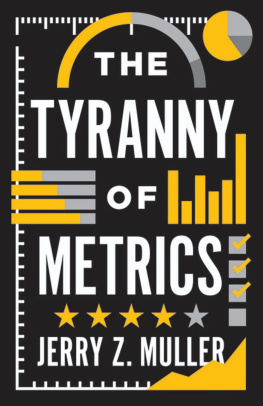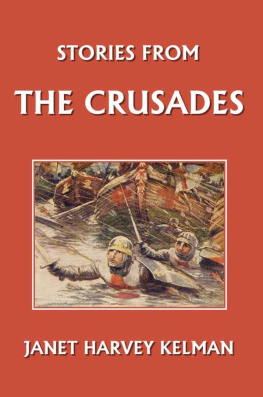NOT MUCH HISTORICAL FICTION HAS BEEN written about the crusades of the 13th century, much less life in the crusader states during this period. The Sixth Crusade, if mentioned at all, is usually condensed to the bloodless return of Jerusalem to Christian control. The inherent flaws in Frederick IIs treatythe short duration of the truce, the prohibitions on Christian fortifications, the legal impediments to the treatyare ignored or glossed over. Likewise, Frederick II Hohenstaufen is more often depicted as a monarch ahead of his time, even as a genius and a man of exceptional tolerance, without acknowledging that many of his contemporaries considered him a tyrant.
From the 15th to the early 20th century, popular adulation of absolutism and central authority transformed Frederick into the embodiment of good government; the fact that he ran roughshod over the law and arbitrarily exercised his authority was largely ignored or justified. Contempt for feudalism (a dogma of the Enlightenment) and hatred of the papacy (a dogma of the Reformation) combined to discredit Fredericks opponents in the eyes of historians. Particularly German scholars of the 19th and early 20th century sought to create a glorious German Emperor to incarnate all the Germanic virtues then in vogue.
While Fredericks struggle with the papacy is legendary, his defeat at the hands of his own barons in the crusader kingdoms of Jerusalem and Cyprus is familiar only to historians of the 13thcentury Latin East. Yet the history of the baronial revolt against Frederick II offers all the ingredients of first-rate historical fiction. On the one side there is the legendary and colorful Emperorthe man who called himself the Wonder of the Worldand on the other side a cast of rebels, who were also scholars and intellectuals, poets and patrons of the arts.
The men of Outremer who opposed Frederick II left an impressive legacy of intellectual accomplishments. They were the authors of histories, poetry, and works of philosophy, although they are most famous today for their outstanding contributions to medieval jurisprudence. The renowned crusades historian Jonathan Riley-Smith goes so far as to claim: Perhaps the greatest monument to the western settlers in Palestine, finer even than the cathedrals and castles still dominating the landscape, is the law-book of John of Jaffa, whichis one of the great works of thirteenth-century thought. (Riley-Smith, Jonathan. The Feudal Nobility and the Kingdom of Jerusalem 1174 1277. Macmillan Press, 1973, p. 230.)
Furthermore, the issues at stake remain relevant today: how much central power is necessary for the good of a state? Does raison detat justify dishonor and treachery? When does a citizen have the right to defend himself against tyranny? At what point is forgiveness and reconciliation the wisest actionregardless of the crimes committed? When is trust constructiveand when is it dangerously nave?
After deciding to write a novel (or more) about this fascinating chapter in human history, the question became which of a large cast of historical figures should I put at the center of my fictional work. Three major historical personalities offered themselves.
- John dIbelin, the Old Lord of Beirut: the original leader of the baronial opposition. A man of moderation and wisdom, Beirut enjoyed huge respect among his contemporaries. He was, furthermore, the youthful hero of The Last Crusader Kingdom. However, he died before the final victory of the baronial revolt. Furthermore, as a wise and elderly widower, even at the start of the revolt, he wasnt ideal for developing drama and romance.
- John dIbelin, Count of Jaffa: the author of the book praised so highly by Riley-Smith (see above). In the later 13th century, Jaffa was an important personality, who took part in King Louis crusade, rebuilt Jaffa from ruins, and was a prolific writer. A colorful character who carried on a notorious, illicit love affair later in life, he had all the qualities of a great fictional hero, but unfortunately, he was born a little too late to be a major actor in the early phases of the baronial revolt at the heart of my novel(s).
- Philip de Novare: the author of the most detailed contemporary account of the revolt, The Wars of Frederick II against the Ibelins in Syria and Cyprus. Philip was a vassal of the Ibelins and unabashedly biased in favor of his patrons. He was a poet, singer, historian, and jurist as welland this was what disqualified him for my hero: he left a far too comprehensive legacy to give me sufficient leeway as a novelist to mold him to my purposes.
So, rather than choosing any of the above for my central protagonist, I chose a character at the very center of the revolt, a man whose adult life spanned the entire crisis, his knighting (coming of age) and death bracketing the historical events depicted. He is a man who, according to Novare, distinguished himself in the fighting, defied an archbishop and his father to marry the woman he loved and won the final victory against the Emperor. Yet, almost the exception among his peers, he did not leave a written legacy that reveals his character, attitudes, and temperament. In short, he was enough of a blank pagedespite the intriguing hints left by Novareto be malleable for literary purposes. The only serious disadvantage to making him my central protagonist was that he bears the same name (indeed was named for) the hero of my Jerusalem Trilogy: Balian dIbelin. He was the eldest son and heir of the Old Lord of Beirut, a grandson of the defender of Jerusalem, and succeeded to the title of Lord of Beirut on his fathers death.
Having selected my male hero, the heroine was predetermined by history: she could only be the woman that Balian II defied the church and his father to marry. Even less is known about her than about Balian II. We know her family heritage, that she was widowed early, and that she actively, at one point decisively, took part in the baronial revolt. That seemed enough material, however, to give me a strong character.
Around these two central characters are grouped the rest of the historical cast: Frederick Hohenstaufen and his five deputies (the baillies of Cyprus), King Henry of Cyprus, Balians father, brothers, sister and cousins, and Philip of Novare himself. I hope that you will find them an appealing, intriguing, and compelling cast of characters, some delightful and some despicable, but all believable and complex.

